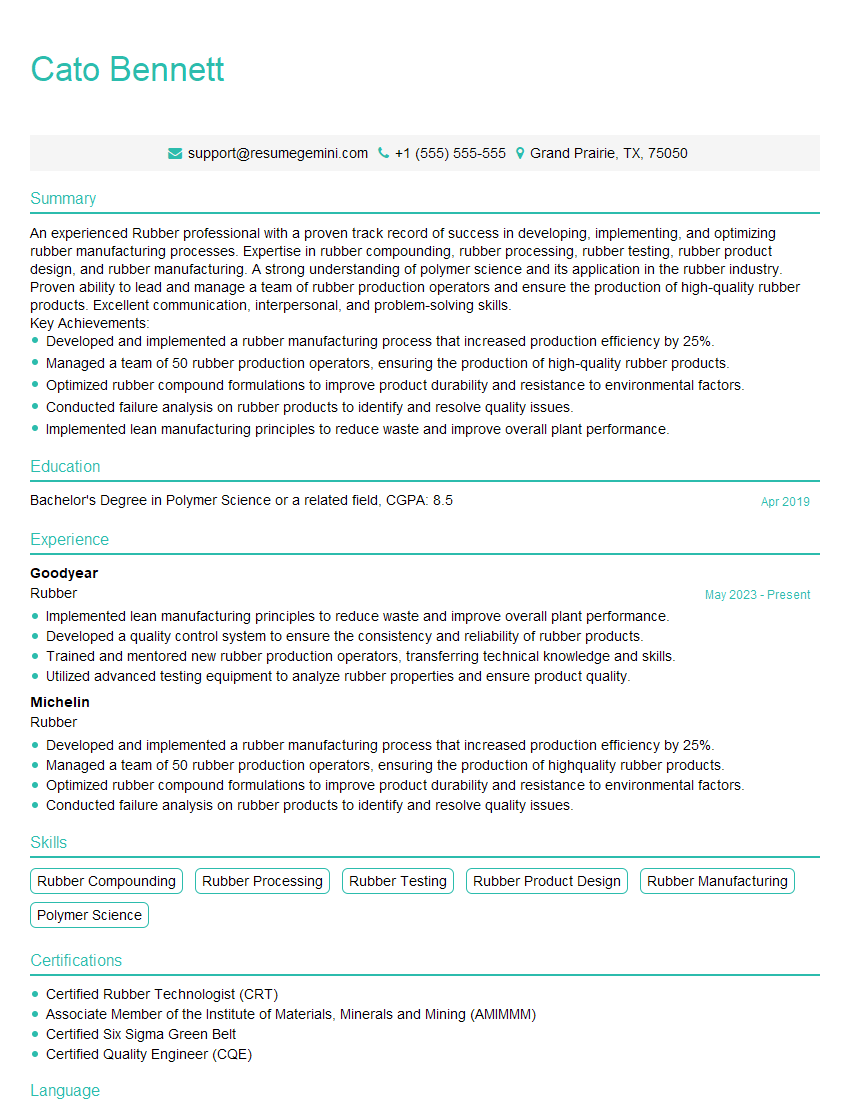Are you a seasoned Rubber seeking a new career path? Discover our professionally built Rubber Resume Template. This time-saving tool provides a solid foundation for your job search. Simply click “Edit Resume” to customize it with your unique experiences and achievements. Customize fonts and colors to match your personal style and increase your chances of landing your dream job. Explore more Resume Templates for additional options.

Cato Bennett
Rubber
Summary
An experienced Rubber professional with a proven track record of success in developing, implementing, and optimizing rubber manufacturing processes. Expertise in rubber compounding, rubber processing, rubber testing, rubber product design, and rubber manufacturing. A strong understanding of polymer science and its application in the rubber industry. Proven ability to lead and manage a team of rubber production operators and ensure the production of high-quality rubber products. Excellent communication, interpersonal, and problem-solving skills.
Key Achievements:
- Developed and implemented a rubber manufacturing process that increased production efficiency by 25%.
- Managed a team of 50 rubber production operators, ensuring the production of high-quality rubber products.
- Optimized rubber compound formulations to improve product durability and resistance to environmental factors.
- Conducted failure analysis on rubber products to identify and resolve quality issues.
- Implemented lean manufacturing principles to reduce waste and improve overall plant performance.
Education
Bachelor’s Degree in Polymer Science or a related field
April 2019
Skills
- Rubber Compounding
- Rubber Processing
- Rubber Testing
- Rubber Product Design
- Rubber Manufacturing
- Polymer Science
Work Experience
Rubber
- Implemented lean manufacturing principles to reduce waste and improve overall plant performance.
- Developed a quality control system to ensure the consistency and reliability of rubber products.
- Trained and mentored new rubber production operators, transferring technical knowledge and skills.
- Utilized advanced testing equipment to analyze rubber properties and ensure product quality.
Rubber
- Developed and implemented a rubber manufacturing process that increased production efficiency by 25%.
- Managed a team of 50 rubber production operators, ensuring the production of highquality rubber products.
- Optimized rubber compound formulations to improve product durability and resistance to environmental factors.
- Conducted failure analysis on rubber products to identify and resolve quality issues.
Certificates
- Certified Rubber Technologist (CRT)
- Associate Member of the Institute of Materials, Minerals and Mining (AMIMMM)
- Certified Six Sigma Green Belt
- Certified Quality Engineer (CQE)
Languages
- English
- French
- German
Career Expert Tips:
- Select the ideal resume template to showcase your professional experience effectively.
- Master the art of resume writing to highlight your unique qualifications and achievements.
- Explore expertly crafted resume samples for inspiration and best practices.
- Build your best resume for free this new year with ResumeGemini. Enjoy exclusive discounts on ATS optimized resume templates.
How To Write Resume For Rubber
- Highlight your experience in developing and implementing rubber manufacturing processes that have resulted in significant improvements in production efficiency.
- Quantify your accomplishments whenever possible, using specific metrics to demonstrate the impact of your work.
- Demonstrate your understanding of rubber science and its application in the rubber industry.
- Showcase your leadership and management skills, particularly in the context of managing a team of rubber production operators.
- Emphasize your commitment to quality and continuous improvement.
Essential Experience Highlights for a Strong Rubber Resume
- Develop and implement rubber manufacturing processes to improve production efficiency.
- Manage a team of rubber production operators to ensure the production of high-quality rubber products.
- Optimize rubber compound formulations to improve product durability and resistance to environmental factors.
- Conduct failure analysis on rubber products to identify and resolve quality issues.
- Implement lean manufacturing principles to reduce waste and improve overall plant performance.
- Develop and implement a quality control system to ensure the consistency and reliability of rubber products.
- Train and mentor new rubber production operators, transferring technical knowledge and skills.
Frequently Asked Questions (FAQ’s) For Rubber
What are the key skills required for a Rubber position?
The key skills required for a Rubber position include rubber compounding, rubber processing, rubber testing, rubber product design, rubber manufacturing, and polymer science.
What are the typical job responsibilities of a Rubber?
The typical job responsibilities of a Rubber include developing and implementing rubber manufacturing processes, managing a team of rubber production operators, optimizing rubber compound formulations, conducting failure analysis on rubber products, implementing lean manufacturing principles, and developing and implementing a quality control system.
What are the qualifications required for a Rubber position?
The qualifications required for a Rubber position typically include a Bachelor’s Degree in Polymer Science or a related field.
What are the career prospects for a Rubber?
The career prospects for a Rubber are good, with opportunities for advancement to positions such as Rubber Production Manager, Rubber Product Development Manager, and Rubber Plant Manager.
What is the salary range for a Rubber?
The salary range for a Rubber can vary depending on factors such as experience, qualifications, and location. According to Salary.com, the average salary for a Rubber in the United States is $75,000.
What are the major challenges facing the rubber industry?
The major challenges facing the rubber industry include the rising cost of raw materials, the increasing demand for sustainable rubber products, and the need to improve production efficiency.
What are the latest trends in the rubber industry?
The latest trends in the rubber industry include the development of new rubber compounds with improved properties, the use of recycled rubber in the production of new rubber products, and the development of new rubber manufacturing technologies.
What are the major applications of rubber?
The major applications of rubber include tires, hoses, belts, gaskets, and seals.